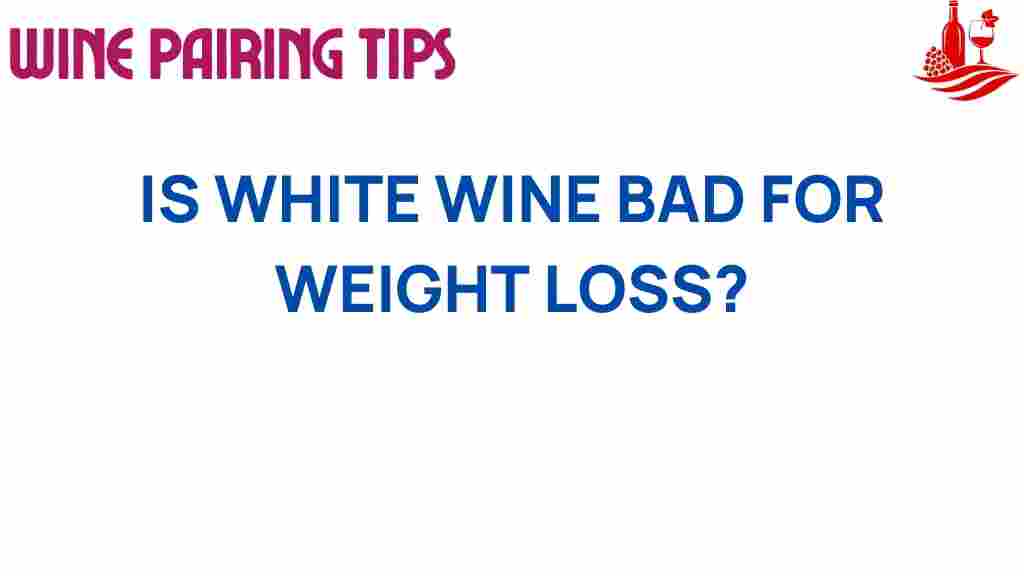Is White Wine Sabotaging Your Weight Loss Goals?
When embarking on a weight loss journey, many people meticulously track their calories, exercise regularly, and maintain a healthy diet. However, one seemingly innocent indulgence, white wine, might be working against your efforts without you even realizing it. In this article, we will explore how white wine impacts your weight loss goals, its nutritional profile, and how you can enjoy it in moderation without sabotaging your fitness aspirations.
The Nutritional Profile of White Wine
Understanding the calorie content and nutritional aspects of white wine is essential for anyone looking to lose weight. Here’s a breakdown of the calories found in different types of white wine:
- Sauvignon Blanc: Approximately 120 calories per 5 oz serving.
- Chardonnay: About 123 calories per 5 oz serving.
- Pinot Grigio: Roughly 122 calories per 5 oz serving.
While these calorie counts may not seem excessively high, they can add up quickly, especially if you enjoy more than one glass. Let’s delve deeper into how these calories can influence your weight loss journey.
How Alcohol Affects Weight Loss
When you consume alcohol, your body prioritizes metabolizing it over other nutrients. This can lead to several issues for those aiming for weight loss:
- Caloric Surplus: Drinking white wine adds extra calories to your daily intake, making it easier to exceed your target.
- Reduced Fat Oxidation: While your body is busy processing alcohol, it may not effectively burn fat, leading to potential weight gain.
- Increased Appetite: Alcohol can lower your inhibitions, leading you to make poor dietary choices or overeat.
Understanding these factors is crucial if you wish to incorporate white wine into your diet without derailing your weight loss goals.
Moderation is Key
One of the most important aspects of enjoying white wine while pursuing weight loss is moderation. Here are some guidelines to help you enjoy your wine without compromising your goals:
- Limit Your Intake: Stick to one glass of white wine (5 oz) per occasion to minimize calorie consumption.
- Choose Wisely: Select lower-calorie options or wines with a lower alcohol content.
- Pair with Healthy Foods: Enjoy your white wine with healthy snacks like veggies and hummus, rather than high-calorie appetizers.
Incorporating White Wine into a Healthy Diet
Finding a balance between enjoying your favorite beverages and sticking to your diet is essential. Here are some tips on how to include white wine in your nutrition plan:
- Plan Your Drinking Days: Designate specific days for enjoying wine to help regulate your overall intake.
- Stay Hydrated: Drink water alongside your white wine to stay hydrated and reduce the urge to overindulge.
- Track Your Calories: Include the calories from white wine in your daily caloric intake to maintain awareness.
Fitness and Alcohol: Finding the Balance
Incorporating physical activity into your routine is vital for weight loss. However, alcohol can impact your fitness in various ways:
- Recovery Time: Alcohol can prolong muscle recovery time, making it harder to stick to your workout routine.
- Dehydration: Alcohol can lead to dehydration, which negatively affects your performance and overall health.
- Energy Levels: Consuming white wine, especially in excess, can sap your energy and motivation to work out.
To mitigate these effects, consider pairing your fitness regimen with mindful drinking. If you plan to drink white wine, schedule your workouts accordingly to optimize your performance and recovery.
Common Misconceptions About White Wine and Weight Loss
There are several myths surrounding alcohol consumption and weight loss. Let’s address some common misconceptions:
- All Alcohol is Bad for Weight Loss: While excessive alcohol consumption can hinder weight loss, moderate drinking may fit into a healthy lifestyle.
- White Wine is Always Lower in Calories: Not all white wines are low in calories; some sweet varieties can have higher sugar content and calories.
- Drinking Wine Can Replace Meals: Relying on wine for nutrition is unhealthy and unsustainable for weight loss.
Awareness of these misconceptions can help you make informed decisions about including white wine in your diet.
Troubleshooting: When Weight Loss Stalls
If you find your weight loss progress has stalled, consider these troubleshooting tips:
- Track Your Intake: Use a food diary or app to log everything you consume, including white wine.
- Evaluate Portion Sizes: Ensure that you are not pouring larger glasses than you realize.
- Reassess Your Diet: Look at your overall nutrition to ensure you are still following a balanced diet.
If you’re still struggling, consult with a nutritionist or dietitian for personalized advice.
Conclusion
While indulging in white wine can be enjoyable, it’s crucial to be mindful of how it fits into your overarching weight loss goals. By understanding the calorie content, practicing moderation, and incorporating healthy habits, you can enjoy your glass of white wine without sabotaging your diet. Remember that balance is key; enjoy your wine as part of a well-rounded approach to nutrition and fitness.
For more information on healthy drinking habits and weight management, visit this resource.
If you’re looking for tips on how to create a balanced diet, check out our article here.
This article is in the category Tips and created by Wine Pairing Tips Team
